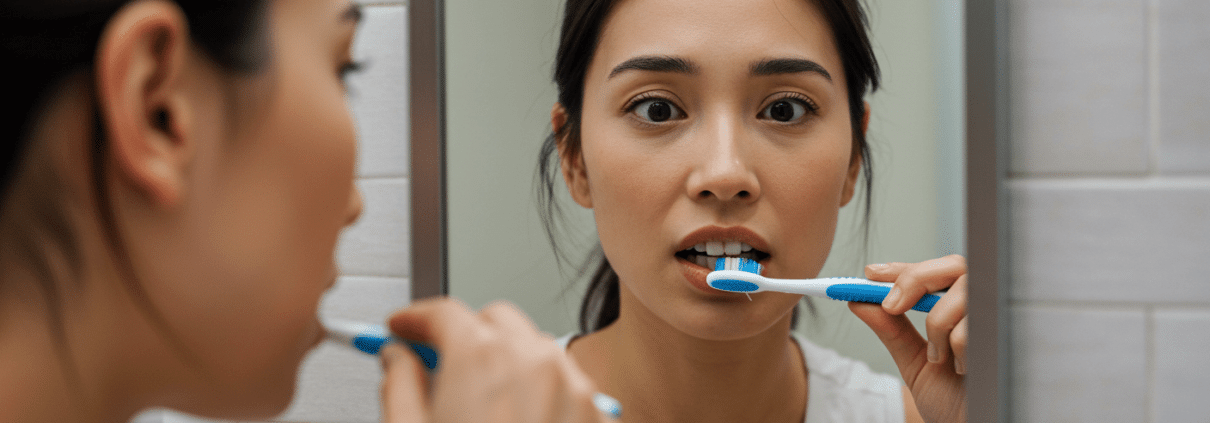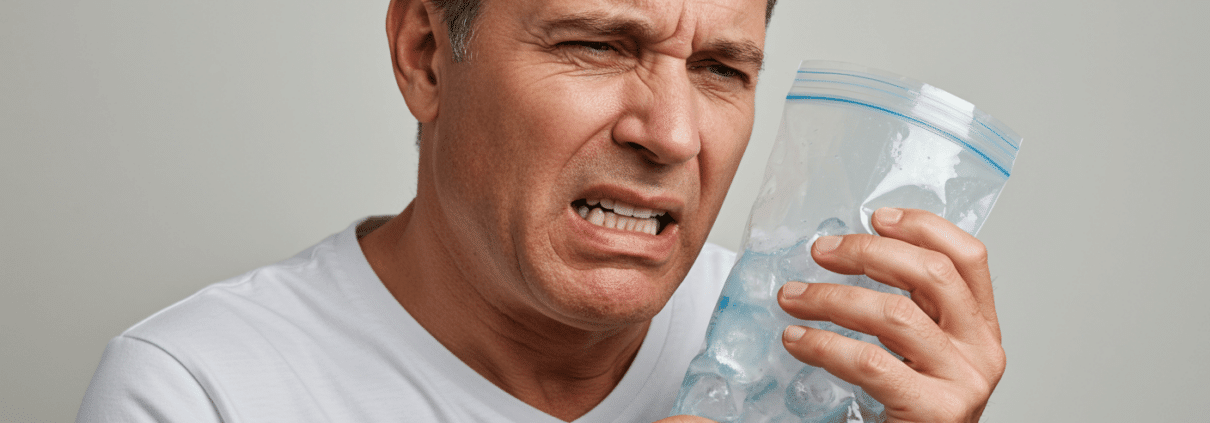We all know that brushing and flossing are essential for a healthy smile, but did you know that some of your everyday habits could be secretly damaging your teeth? From the way you sip your morning coffee to how you handle stress, small routines can have a big impact on your oral health—for better or worse.
In this blog, we’ll uncover surprising ways your daily habits are impacting your teeth, how they can lead to problems like cavities, enamel erosion, and gum disease, and what you can do to protect your smile.
If you’re wondering why you still get cavities despite good oral hygiene, or why your teeth feel sensitive out of nowhere, your daily habits may be the culprit!
TLDR – Quick Guide
- Diet and drinking habits – Acidic and sugary drinks weaken enamel, leading to decay.
- Nail-biting, grinding, and chewing ice – These habits can cause chipped teeth and jaw issues.
- Brushing mistakes – Overbrushing and using the wrong technique can damage gums and enamel.
- Skipping water and mouthwash – Dehydration leads to dry mouth, increasing the risk of cavities.
- Stress and oral health – Stress can cause teeth grinding, gum disease, and mouth ulcers.
1. Your Diet & Drinking Habits Matter More Than You Think
What you eat and drink every day plays a huge role in your dental health.
🚨 Biggest offenders:
- Sugary drinks (soda, fruit juice, energy drinks) – Bacteria in your mouth thrive on sugar, leading to cavities and decay.
- Acidic beverages (coffee, tea, wine, citrus juices) – Can erode enamel over time, making teeth sensitive.
- Frequent snacking – Constant snacking means your teeth are exposed to acids longer, increasing the risk of cavities.
💡 Better choices: Drink water throughout the day, use a straw for acidic drinks, and rinse your mouth after consuming sugar.
2. Nail-Biting, Teeth Grinding, and Chewing Ice – Bad News for Your Teeth
🚨 Why these habits are harmful:
- Nail-biting – Can chip or crack teeth and introduce bacteria into your mouth.
- Teeth grinding (bruxism) – Wears down enamel, causes jaw pain and headaches, and can lead to TMJ disorders.
- Chewing ice – The hardness of ice can crack or break teeth, leading to expensive repairs.
💡 Solutions: Try stress-reducing techniques, wear a mouthguard if you grind your teeth, and chew sugar-free gum instead of biting nails.
3. Brushing Mistakes That Could Be Hurting Your Teeth
Even if you brush daily, doing it incorrectly can cause more harm than good.
🚨 Common brushing mistakes:
- Brushing too hard – Can wear down enamel and irritate gums, leading to recession.
- Using the wrong toothbrush – Hard-bristled brushes can cause damage; soft bristles are best.
- Skipping nighttime brushing – At night, saliva production slows down, making teeth more vulnerable to bacteria.
💡 Pro tip: Use a soft-bristled toothbrush, brush twice a day for two minutes, and replace your toothbrush every 3-4 months.
4. Not Drinking Enough Water Leads to Dry Mouth & Decay
Saliva is your natural defense against cavities, washing away food particles and neutralizing acids. If you’re not drinking enough water, you may experience dry mouth (xerostomia), which increases your risk of:
- Cavities and gum disease
- Bad breath
- Tooth sensitivity
💡 Fix it: Drink plenty of fluoridated water, chew sugar-free gum to stimulate saliva, and avoid excessive caffeine or alcohol, which dry out your mouth.
5. Stress Can Wreak Havoc on Your Oral Health
Stress doesn’t just affect your mental health—it can also take a serious toll on your teeth.
🚨 Common stress-related dental issues:
- Bruxism (teeth grinding) – Often happens unconsciously, especially at night.
- Gum disease – Chronic stress weakens the immune system, making gums more vulnerable to infection.
- Mouth ulcers & canker sores – Stress can trigger painful sores in the mouth.
💡 What to do: Practice stress management techniques like meditation, yoga, or deep breathing. If you grind your teeth, ask your dentist about a nightguard.
Key Takeaways
✔ Your daily habits have a direct impact on your teeth—for better or worse.
✔ Sugary and acidic drinks weaken enamel, increasing the risk of decay.
✔ Bad habits like nail-biting, teeth grinding, and chewing ice can damage teeth.
✔ Brushing mistakes, skipping water, and high stress levels all contribute to oral health problems.
✔ Making small changes in your daily routine can significantly improve your dental health.
💡 Final Thought: A healthy smile starts with daily habits. Want to improve your oral health? Start by making one small change today!
FAQs About How Daily Habits Impact Your Teeth
1. How bad is it to sip on coffee or soda throughout the day?
Very bad! Sipping continuously keeps your teeth bathed in acid, weakening enamel. If you must drink these beverages, use a straw and rinse with water afterward.
2. Can stress really cause tooth problems?
Yes! Stress increases the risk of teeth grinding, gum disease, and mouth sores. Managing stress can improve both your mental and oral health.
3. What’s the worst habit for your teeth?
Besides poor brushing, teeth grinding and frequent sugar consumption are among the worst offenders. Both can cause severe damage over time.
4. How do I stop nail-biting and teeth grinding?
Try stress-reducing activities, use bitter-tasting nail polish to discourage nail-biting, and ask your dentist about a nightguard if you grind your teeth.
5. Is mouthwash necessary for good oral health?
While not a substitute for brushing and flossing, fluoride or antibacterial mouthwash can help reduce plaque and prevent cavities. Avoid alcohol-based rinses if you have dry mouth.
A sudden toothache, a knocked-out tooth, or a broken filling—dental emergencies always seem to happen at the worst times. Whether it’s during a vacation, in the middle of the night, or right before a big event, knowing how to react can make all the difference.
Some dental problems need immediate attention to prevent pain, infection, or permanent damage, while others can wait for a scheduled appointment. The key is knowing the difference and acting fast when necessary.
This guide to Dental Emergencies 101 will help you recognize urgent oral health issues and provide practical steps to handle them until you can see a dentist.
TL;DR – Quick Guide
- Severe pain, swelling, or bleeding? See a dentist immediately.
- Knocked-out tooth? Keep it moist and get to a dentist within 30-60 minutes.
- Chipped or cracked tooth? Rinse, save broken pieces, and call your dentist.
- Lost filling or crown? Use dental wax or temporary cement until a dentist fixes it.
- Swelling or infection? Seek urgent care—infections can spread quickly.
Common Dental Emergencies and How to Handle Them
1. Severe Toothache
Symptoms:
✅ Persistent or throbbing pain
✅ Sensitivity to hot or cold
✅ Swollen gums or face
What to Do:
- Rinse with warm saltwater to reduce inflammation.
- Take over-the-counter pain relievers (but don’t place aspirin directly on the gums—it can burn!).
- Use a cold compress on your cheek to minimize swelling.
- Call your dentist immediately if pain is severe or lasts more than 24 hours.
🚨 Emergency? If the pain is unbearable or accompanied by fever and swelling, it could be an abscess or infection, requiring urgent treatment.
2. Knocked-Out Tooth
What to Do:
- Find the tooth and handle it by the crown (top), not the root.
- Rinse gently with water (no scrubbing!).
- Try to place it back in the socket. If not possible, keep it in milk, saline, or saliva.
- See a dentist within 30-60 minutes—the sooner, the better for saving the tooth!
🚨 Emergency? Yes! A knocked-out tooth is time-sensitive—quick action increases the chances of successful reimplantation.
3. Chipped or Broken Tooth
What to Do:
- Rinse your mouth with warm water to clean the area.
- If there’s bleeding, apply gentle pressure with gauze.
- Save any broken pieces and bring them to your dentist.
- Apply a cold compress to reduce swelling.
- Avoid hard foods and see your dentist ASAP.
🚨 Emergency? If there’s pain, a large fracture, or nerve exposure, you need urgent care. Small chips may not be emergencies but should still be checked.
4. Lost Filling or Crown
What to Do:
- If a filling falls out, place sugar-free gum or temporary dental cement (available at drugstores) in the cavity.
- If a crown comes off, try to reapply it with dental cement or toothpaste.
- Avoid chewing on that side until fixed by a dentist.
🚨 Emergency? Not always, but see your dentist soon to prevent further damage.
5. Abscess or Swelling (Signs of Infection)
Symptoms:
⚠️ Intense, throbbing tooth pain
⚠️ Swelling in gums, face, or jaw
⚠️ Bad taste or pus discharge
⚠️ Fever or difficulty swallowing
What to Do:
- Call your dentist immediately.
- Rinse with warm saltwater to ease swelling.
- Take pain relievers to manage discomfort.
- Avoid lying flat—keep your head elevated to reduce swelling.
🚨 Emergency? Yes! Dental infections can spread to the bloodstream (sepsis) or affect breathing. Get urgent care if you have fever, swelling, or difficulty breathing.
What’s NOT an Emergency?
While urgent dental care is crucial for some situations, not all issues require immediate attention. These can often wait for a scheduled appointment:
- Mild tooth sensitivity
- Small chips or minor cracks without pain
- A loose baby tooth (unless causing severe pain or infection)
- Mild gum irritation
That said, if you’re unsure, call your dentist—they can advise whether you need emergency treatment or can wait.
Key Takeaways
✔ Severe pain, swelling, or bleeding? Get to a dentist immediately.
✔ Knocked-out tooth? Keep it moist and see a dentist within 30-60 minutes.
✔ Lost filling or crown? Use temporary dental cement and book an appointment soon.
✔ Abscess or facial swelling? Seek urgent care to prevent infection spread.
✔ When in doubt, call your dentist! It’s always better to be safe than sorry.
FAQs
1. What should I do if I break a tooth but don’t have pain?
If there’s no pain, swelling, or nerve exposure, it’s not an immediate emergency. However, you should still see a dentist soon to prevent further damage.
2. Can I go to the ER for a dental emergency?
ERs can manage infections and severe swelling but usually don’t treat dental issues directly. It’s best to see a dentist or emergency dental clinic for tooth-related problems.
3. What if my child knocks out a baby tooth?
Unlike adult teeth, knocked-out baby teeth aren’t reinserted. Still, see a dentist to ensure no damage was done to the permanent tooth developing underneath.
4. How do I know if an infection is serious?
If you have severe swelling, fever, or difficulty breathing/swallowing, it’s an emergency. Dental infections can spread rapidly, so seek urgent care immediately.
5. Can I prevent dental emergencies?
Yes! Regular check-ups, wearing mouthguards for sports, avoiding chewing on hard objects, and maintaining good oral hygiene can help prevent many dental emergencies.
A knocked-out tooth is a dental emergency that requires immediate action. Whether it happens during a sports game, an accident, or even a simple slip and fall, knowing what to do in the first few minutes can mean the difference between saving and losing your tooth.
Did you know that if a knocked-out tooth is properly reinserted within an hour, there’s a 90% chance it can be saved? Unfortunately, many people don’t know the correct steps to take, leading to permanent tooth loss.
In this guide, we’ll walk you through exactly what to do if you knock out a tooth, how to handle the situation safely, and what to expect from emergency dental treatment.
TL;DR – Quick Guide
- Step 1: Stay calm and locate the tooth immediately.
- Step 2: Pick up the tooth by the crown (top), NOT the root.
- Step 3: If dirty, gently rinse it with milk or saline, but do not scrub.
- Step 4: Try to reinsert it into the socket if possible. If not, store it in milk or saliva.
- Step 5: Get to a dentist within 30-60 minutes for the best chance of saving the tooth.
Step-by-Step Guide to Saving a Knocked-Out Tooth
1. Stay Calm and Find the Tooth
The first thing to do is stay calm and act quickly. Locate the tooth as soon as possible to prevent losing or damaging it further.
2. Pick Up the Tooth Carefully
✅ Always hold the tooth by the crown (the white top part), NOT the root.
❌ Do not touch, scrub, or remove any tissue attached to the root. The root contains important fibers that help with reattachment.
3. Rinse the Tooth Gently (If Needed)
If the tooth is dirty, rinse it briefly with milk, saline, or saliva.
❌ Do NOT use tap water—it contains chemicals that can damage the root cells.
❌ Do NOT scrub, use soap, or dry the tooth.
4. Try to Reinsert the Tooth into the Socket
The best place for a knocked-out tooth is back in its socket. If possible:
- Align the tooth correctly and gently push it back in place.
- Bite down on a piece of gauze or a clean cloth to hold it in position.
If reinsertion isn’t possible, move to step 5.
5. Store the Tooth Properly If You Can’t Reinsert It
If you can’t place the tooth back into the socket, it needs to stay moist until you reach the dentist. Store it in:
✅ Milk (best option) – Keeps root cells alive.
✅ Saliva (hold it in your cheek) – A good alternative if milk isn’t available.
✅ A tooth preservation kit (like Save-A-Tooth).
❌ Do NOT store the tooth in water—it can kill the root cells and reduce the chances of reattachment.
6. Get to a Dentist Immediately
Time is crucial! See a dentist within 30-60 minutes. The sooner the tooth is reimplanted, the better the success rate.
What Happens at the Dentist?
Your dentist will:
- Reinsert the tooth (if it hasn’t been placed back already).
- Secure it with a splint, which holds it in place for a few weeks.
- Monitor healing and perform a root canal (if needed).
If the tooth cannot be saved, your dentist may discuss dental implants, bridges, or partial dentures as replacement options.
Long-Term Care After a Knocked-Out Tooth
Even if the tooth is successfully reimplanted, long-term care is needed:
✅ Follow oral hygiene instructions given by your dentist.
✅ Avoid chewing hard foods on the affected side.
✅ Attend follow-up visits to check healing.
✅ If a root canal was performed, monitor the tooth for signs of infection.
When to See a Dentist Even If the Tooth Was Saved
Even if you successfully place the tooth back, you should still see a dentist ASAP if:
✅ The tooth feels loose or painful.
✅ The gums around the tooth start swelling or bleeding.
✅ You experience nerve damage symptoms (like numbness).
✅ The tooth starts changing color (a sign of dying nerve tissue).
Key Takeaways
- A knocked-out tooth is a dental emergency—act fast!
- Hold the tooth by the crown, NOT the root.
- Do not scrub the tooth—rinse with milk or saline if needed.
- Reinsert the tooth if possible or store it in milk/saliva.
- Get to a dentist within 30-60 minutes for the best chance of saving it.
A knocked-out tooth doesn’t have to mean permanent tooth loss—but every second counts. If you ever find yourself in this situation, following these steps could save your smile!
FAQs
1. Can a knocked-out tooth always be saved?
Not always, but if reinserted within 60 minutes, there’s a high chance of success. If left out too long, the root cells die, making reattachment unlikely.
2. What should I do if I knock out a baby tooth?
Do NOT try to reinsert it! Unlike adult teeth, baby teeth shouldn’t be put back, as this can damage the developing permanent tooth underneath. See a dentist for guidance.
3. Is milk really the best liquid for storing a knocked-out tooth?
Yes! Milk helps keep the root cells alive, unlike water, which can damage them. If milk isn’t available, saliva or saline solution are the next best options.
4. What if the tooth is broken instead of completely knocked out?
If a tooth is broken, save any fragments and visit a dentist immediately. Depending on the damage, they may bond the pieces back together, place a crown, or recommend other treatments.
5. Can I eat or drink after knocking out a tooth?
Avoid chewing on the injured side and stick to soft foods until your dentist gives you the green light. Avoid hot, cold, or hard foods that could irritate the area.



